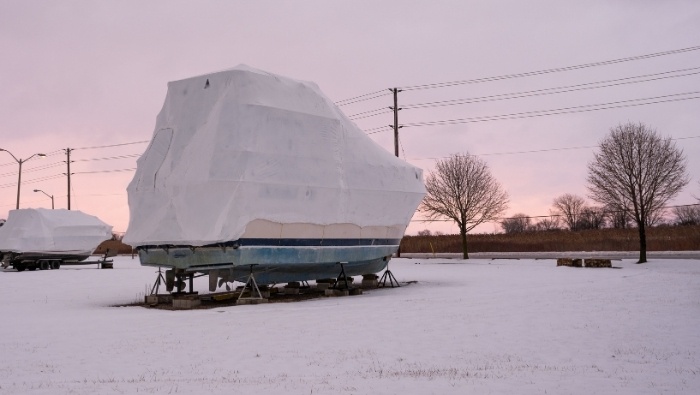Save Time and Money on Winter Storage
For many, autumn signals the end of the boating season. So, here are some time- and money-saving tips on winter storage of ‘Old Betsy’ and any other toys you need to store until warmer weather returns.
by Rich Finzer

We Americans love our toys, whether it’s antique automobiles or snazzy powerboats. But for many, autumn signals the end of the boating or cruising season. So now what?
For while we love our toys, many folks suffer from a “longage” of stuff and a shortage of storage. And that’s where guys like me come in. I’ve operated a winter storage business since 1988. So here are some time- and money-saving tips you might employ when tucking “Old Betsy” away for the winter.
Store Locally
Storing close to home yields numerous advantages. You’ll burn less time and gasoline while delivering your vehicle. More importantly, if a return trip is needed to address some overlooked detail, it’s a short hop.
Rates
Storage space rates vary from one facility to another. Some charge by the month, others by the season. Some charge by the square foot, others by the overall length. So check around and compare rates. Knowledge is power (the power to save money).
You deserve a comfortable retirement.
Appearances Count
How tidy is the facility? If you notice junk scattered haphazardly around the place or a general atmosphere of grime, scratch it from your list.
There’s one other critical thing to watch for and that’s pigeons! Feral pigeons are pests and pigeon poop is corrosive enough to eat through exposed metal or automotive coatings. In 1991, a pair of pigeons attempted to make my facility their home. After luring them outside, both succumbed to lead poisoning! The bottom line is I won’t tolerate the presence of “roof chickens,” and you shouldn’t either.
The Contract
The heart of any storage arrangement is the contract. Any you’re asked to sign should be clearly written in plain English and include the following:
- Storage period
- Charges and payment terms
- Identification of items being stored with registration numbers, make, model, and plate numbers
- Your name, address, home/cell/work phone numbers and email address
- The same information about the facility
- Signature lines, date and receipt
- Any special terms, including:
- Customer must provide evidence of insurance
- Clauses limiting liability for perils, such as fire or roof collapse
- Additional fees (if any) for remaining past the end of the contracted storage period
- Other clauses necessary to fit special circumstances
Steer clear of any facility that won’t provide you with a blank copy to examine, or if the contract has more fine print than your cell phone’s manual.
Security
Be certain the facility has adequate security, such as alarms and reliable locks. For the record, my operation does not have an alarm, but it’s secure nonetheless. I don’t plow the snow away from the exterior doors, and no thief is going to bash through a wall of snow, which might be four feet deep.
Four-Legged Intruders
While burglars have never been an issue, most facilities (including mine) frequently harbor mice. Here’s how to discourage them:
- Before storing a vehicle, thoroughly vacuum the interior to remove any crumbs or bits of food.
- Scatter mothballs in the trunk, on interior carpets, under seats, and in the glove box.
- Drape dryer sheets across the upholstery.
- For cars equipped with carburetors, stuff steel wool into the air cleaner intake and dump mothballs atop the cover.
- And for goodness sake, don’t set mousetraps in the trunk or interior! If the traps function properly, in the springtime, your nostrils will be greeted by the delightful odor of decaying rodent flesh. The object is not to kill mice. Instead, it’s to drive them away. Spending a few bucks on dryer sheets and mothballs is infinitely preferable to dealing with mouse damage.
Covers
To prevent dust or condensation from settling, acquire a tarp or cover. Car covers are available at most auto parts stores. The best styles are made of lightweight fabric that breathes. For boats, a plastic tarp is more than adequate protection.
Final Tasks
Remove your battery. Stored at home, it will hold a charge much longer than in a cold building. Discard any accumulated junk from the passenger compartment. Leave an ignition key with the facility. If an emergency forces removal of your vehicle, it can’t be started without one. The operator will have a spare battery for just such a situation.
Follow these rules and winter storage becomes a task you won’t dread in advance. In the springtime, you’ll be ready for another season of cruising or boating.
Reviewed October 2024
About the Author
Rich Finzer resides in upstate New York. During his 40+ years as a writer, he has published over 1,200 newspaper, magazine and Internet articles. His award-winning book Maple On Tap: Making Your Own Maple Syrup is available Amazon.
Sign me up for a comfortable retirement!
Popular Articles
- Comparing Retirement Housing Options
- How We Retired With Almost No Savings
- How Retirees Can Live on a Tight Budget
- 9 Things You Need to Do Before You Retire
- What You Need to Know About Long Term Care Insurance Before You Retire
- You Didn’t Save Enough for Retirement and You’re 55+
- Could Debt Derail Your Retirement? A Checklist
- Your Emergency Fund In Retirement: A Comprehensive Guide
- Managing Your 401k In Your 50s

